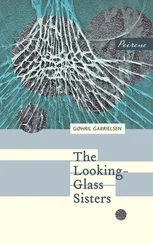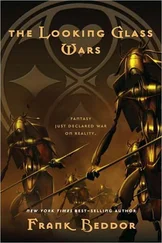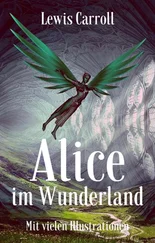“Oh!” said Alice. She was too much puzzled to make any other remark.
“Ah, you should see 'em come round me of a Saturday night,” Humpty Dumpty went on, wagging his head gravely from side to side: “for to get their wages, you know.”
(Alice didn't venture to ask what he paid them with; and so you see I can't tell YOU.)
“You seem very clever at explaining words, Sir,” said Alice. “Would you kindly tell me the meaning of the poem called “Jabberwocky”?”
“Let's hear it,” said Humpty Dumpty. “I can explain all the poems that were ever invented—and a good many that haven't been invented just yet.”
This sounded very hopeful, so Alice repeated the first verse:
'Twas brillig, and the slithy toves
Did gyre and gimble in the wabe;
All mimsy were the borogoves,
And the mome raths outgrabe.
“That's enough to begin with,” Humpty Dumpty interrupted: “there are plenty of hard words there. “BRILLIG” means four o'clock in the afternoon—the time when you begin BROILING things for dinner.”
“That'll do very well,” said Alice: and “SLITHY”?”
“Well, “SLITHY” means “lithe and slimy.” “Lithe” is the same as “active.” You see it's like a portmanteau—there are two meanings packed up into one word.”
“I see it now,” Alice remarked thoughtfully: “and what are “TOVES”?”
“Well, “TOVES” are something like badgers—they're something like lizards—and they're something like corkscrews.”
“They must be very curious looking creatures.”
“They are that,” said Humpty Dumpty: “also they make their nests under sun-dials—also they live on cheese.”
“Andy what's the “GYRE” and to “GIMBLE”?”
“To “GYRE” is to go round and round like a gyroscope. To “GIMBLE” is to make holes like a gimlet.”
“And “THE WABE” is the grass-plot round a sun-dial, I suppose?” said Alice, surprised at her own ingenuity.
“Of course it is. It's called “WABE,” you know, because it goes a long way before it, and a long way behind it—”
“And a long way beyond it on each side,” Alice added.
“Exactly so. Well, then, “MIMSY” is “flimsy and miserable” (there's another portmanteau for you). And a “BOROGOVE” is a thin shabby-looking bird with its feathers sticking out all round— something like a live mop.”
“And then “MOME RATHS”?” said Alice. “I'm afraid I'm giving you a great deal of trouble.”
“Well, a “RATH” is a sort of green pig: but “MOME” I'm not certain about. I think it's short for “from home"—meaning that they'd lost their way, you know.”
“And what does “OUTGRABE” mean?”
“Well, “OUTGRABING” is something between bellowing and whistling, with a kind of sneeze in the middle: however, you'll hear it done, maybe—down in the wood yonder—and when you've once heard it you'll be QUITE content. Who's been repeating all that hard stuff to you?”
“I read it in a book,” said Alice. “But I had some poetry repeated to me, much easier than that, by—Tweedledee, I think it was.”
“As to poetry, you know,” said Humpty Dumpty, stretching out one of his great hands, “I can repeat poetry as well as other folk, if it comes to that—”
“Oh, it needn't come to that!” Alice hastily said, hoping to keep him from beginning.
“The piece I'm going to repeat,” he went on without noticing her remark,” was written entirely for your amusement.”
Alice felt that in that case she really OUGHT to listen to it, so she sat down, and said “Thank you” rather sadly.
“In winter, when the fields are white,
I sing this song for your delight—
only I don't sing it,” he added, as an explanation.
“I see you don't,” said Alice.
“If you can SEE whether I'm singing or not, you've sharper eyes than most.” Humpty Dumpty remarked severely. Alice was silent.
“In spring, when woods are getting green,
I'll try and tell you what I mean.”
“Thank you very much,” said Alice.
“In summer, when the days are long,
Perhaps you'll understand the song:
In autumn, when the leaves are brown,
Take pen and ink, and write it down.”
“I will, if I can remember it so long,” said Alice.
“You needn't go on making remarks like that,” Humpty Dumpty said: “they're not sensible, and they put me out.”
“I sent a message to the fish:
I told them “This is what I wish.”
The little fishes of the sea,
They sent an answer back to me.
The little fishes” answer was
“We cannot do it, Sir, because—"“
“I'm afraid I don't quite understand,” said Alice.
“It gets easier further on,” Humpty Dumpty replied.
“I sent to them again to say
“It will be better to obey.”
The fishes answered with a grin,
“Why, what a temper you are in!”
I told them once, I told them twice:
They would not listen to advice.
I took a kettle large and new,
Fit for the deed I had to do.
My heart went hop, my heart went thump;
I filled the kettle at the pump.
Then some one came to me and said,
“The little fishes are in bed.”
I said to him, I said it plain,
“Then you must wake them up again.”
I said it very loud and clear;
I went and shouted in his ear.”
Humpty Dumpty raised his voice almost to a scream as he repeated this verse, and Alice thought with a shudder, “I wouldn't have been the messenger for ANYTHING!”
“But he was very stiff and proud;
He said “You needn't shout so loud!”
And he was very proud and stiff;
He said “I'd go and wake them, if—”
I took a corkscrew from the shelf:
I went to wake them up myself.
And when I found the door was locked,
I pulled and pushed and kicked and knocked.
And when I found the door was shut,
I tried to turn the handle, but—”
There was a long pause.
“Is that all?” Alice timidly asked.
“That's all,” said Humpty Dumpty. “Good-bye.”
This was rather sudden, Alice thought: but, after such a VERY strong hint that she ought to be going, she felt that it would hardly be civil to stay. So she got up, and held out her hand. “Good-bye, till we meet again!” she said as cheerfully as she could.
“I shouldn't know you again if we DID meet,” Humpty Dumpty replied in a discontented tone, giving her one of his fingers to shake; “you're so exactly like other people.”
“The face is what one goes by, generally,” Alice remarked in a thoughtful tone.
“That's just what I complain of,” said Humpty Dumpty. “Your face is the same as everybody has—the two eyes, so—” (marking their places in the air with this thumb) “nose in the middle, mouth under. It's always the same. Now if you had the two eyes on the same side of the nose, for instance—or the mouth at the top—that would be SOME help.”
“It wouldn't look nice,” Alice objected. But Humpty Dumpty only shut his eyes and said “Wait till you've tried.”
Alice waited a minute to see if he would speak again, but as he never opened his eyes or took any further notice of her, she said “Good-bye!” once more, and, getting no answer to this, she quietly walked away: but she couldn't help saying to herself as she went, “Of all the unsatisfactory—” (she repeated this aloud, as it was a great comfort to have such a long word to say) “of all the unsatisfactory people I EVER met—” She never finished the sentence, for at this moment a heavy crash shook the forest from end to end.
Chapter VII
THE LION AND THE UNICORN
The next moment soldiers came running through the wood, at first in twos and threes, then ten or twenty together, and at last in such crowds that they seemed to fill the whole forest. Alice got behind a tree, for fear of being run over, and watched them go by.
Читать дальше
Конец ознакомительного отрывка
Купить книгу











